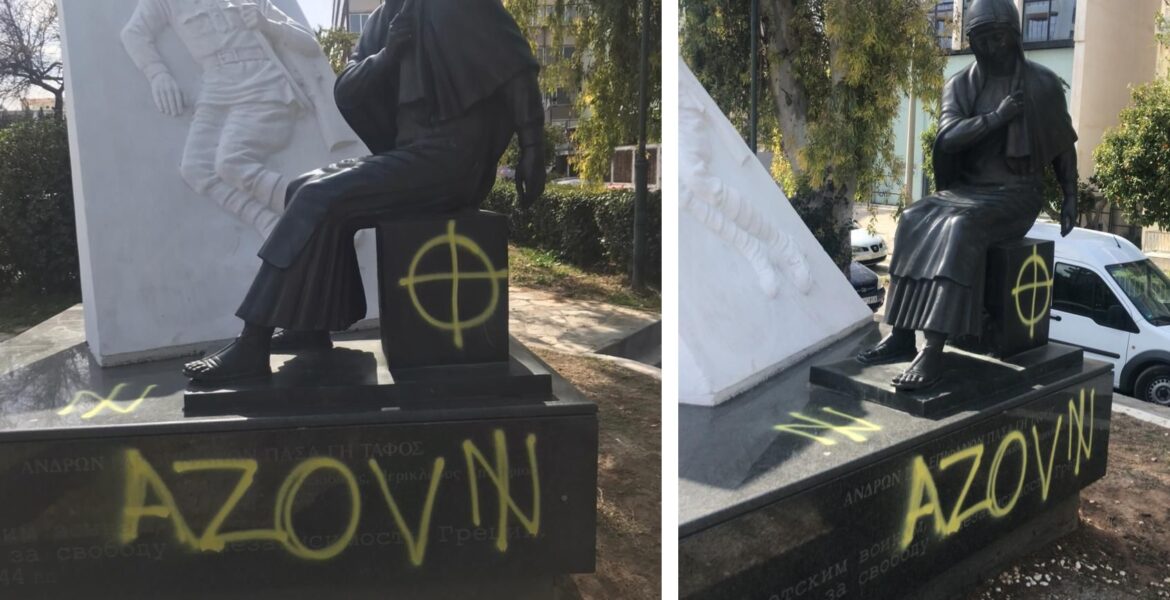A monument to the fallen Soviet soldiers in the Athens neighbourhood of Kallithea was vandalised with the word “Azov”, referring to Ukraine’s neo-Nazi Azov Battalion that is based in the Greek-founded city of Mariupol.
The Greek Ministry of Foreign Affairs, now, in a post, unequivocally condemns the desecration of the monument.
“Greece, a country that suffered from the Nazi occupation, has a special sensitivity in protecting the memory of the victims of Nazism,” he said, among other things.
The announcement of the Ministry of Foreign Affairs in detail:
“We condemn the desecration of a monument dedicated to the memory of three Soviet soldiers who were executed by the Nazi occupation forces in the summer of 1944.
“Greece, a country that suffered from the Nazi occupation, is particularly sensitive in protecting the memory of the victims of Nazism and condemns any use of symbols from this dark period of history.”
The monument that was desecrated:


The Russian Embassy in Greece wrote on Telegram:
“Supporters of the NATO-favored Ukrainian neo-Nazi ‘Azov’ armed formation (which for so many years has been terrorising and murdering civilians in the Eastern Ukraine) have encroached, in Greece, on the sacred memory of the Soviet soldiers who sacrificed their lives in the struggle to liberate the enslaved Europe from fascism and Nazism in the World War II.”
“We unequivocally condemn this unacceptable act of vandalism and immoral attempt against the History and call on the Hellenic authorities to investigate it and bring those responsible to justice,” the statement added.
READ MORE: Greek in Mariupol: “The fascist Ukrainians would kill me, they don’t let us leave the city” (VIDEO)
Azov Special Operations Detachment (Ukrainian: Окремий загін спеціального призначення «Азов»), or Azov Battalion, is a right-wing extremist and neo-Nazi unit of the National Guard of Ukraine, based in Mariupol, in the Azov Sea coastal region.
In 2014, the regiment gained notoriety after allegations emerged of torture and war crimes, as well as neo-Nazi sympathies and usage of associated symbols by the regiment itself, as seen in their logo featuring the Wolfsangel, one of the original symbols used by the 2nd SS Panzer Division Das Reich.
Representatives of the Azov Battalion say that the symbol is an abbreviation for the slogan Ідея Нації (Ukrainian for “National Idea”) and deny connection with Nazism.
In 2014, a spokesman for the regiment said around 10–20% of the unit were neo-Nazis.
READ MORE: Greece announces willingness to host Ukrainian refugees.
In 2018, a provision in an appropriations bill passed by the U.S. Congress blocked military aid to Azov on the grounds of its white supremacist ideology; in 2015, a similar ban on aid to the group was overturned by the Congress.
Members of the regiment come from 22 countries and are of various backgrounds.
More than half of the regiment’s members speak Russian and come from eastern Ukraine, including cities of Donetsk and Luhansk.
The unit’s first commander was far-right nationalist Andriy Biletsky, who led the neo-Nazi Social-National Assembly and Patriot of Ukraine.
In its early days, Azov was a special police company of the Ministry of Internal Affairs, led by Volodymyr Shpara, the leader of the Vasylkiv, Kyiv, branch of Patriot of Ukraine and Right Sector.
In 2018, the U.S. House of Representatives also passed a provision blocking any training of Azov members by American forces, citing its neo-Nazi connections.
The House had previously passed amendments banning support of Azov between 2014 and 2017, but due to pressure from The Pentagon, the amendments were quietly lifted.
This was protested by the Simon Wiesenthal Center which stated that lifting the ban highlighted the danger of Holocaust distortion in Ukraine.
READ MORE: Who is the Pontian Greek fighting in Mariupol against the Azov Battalion?


